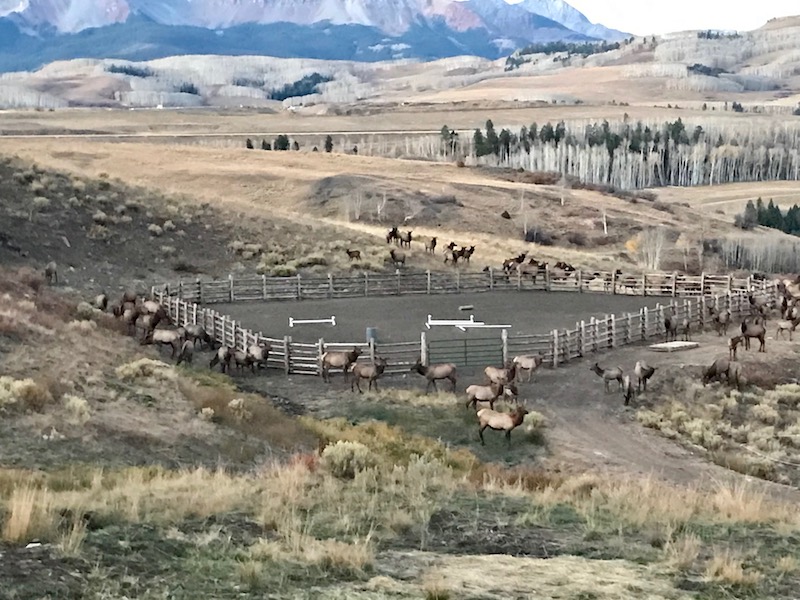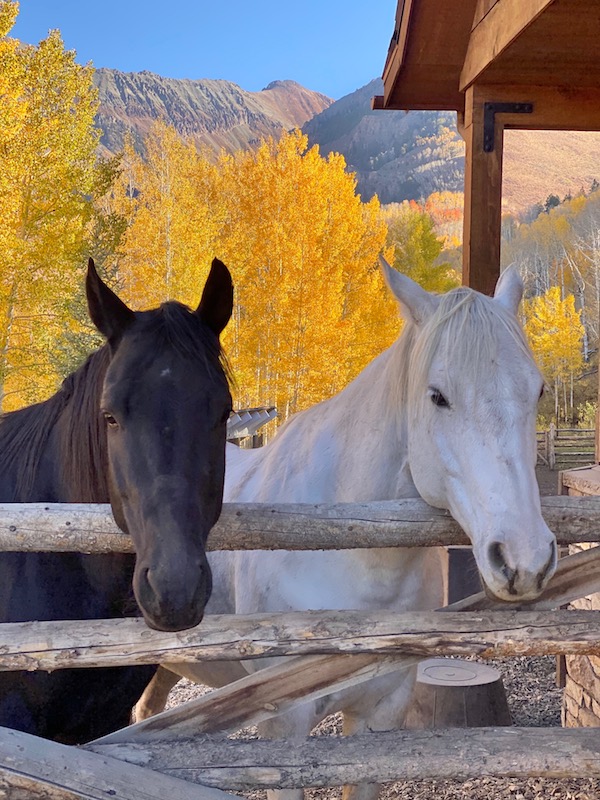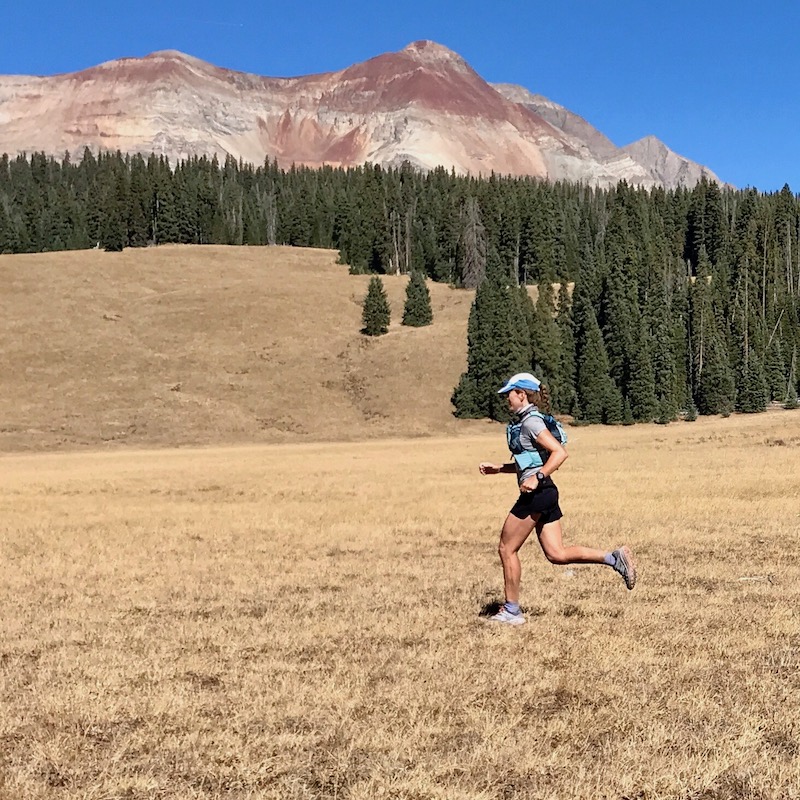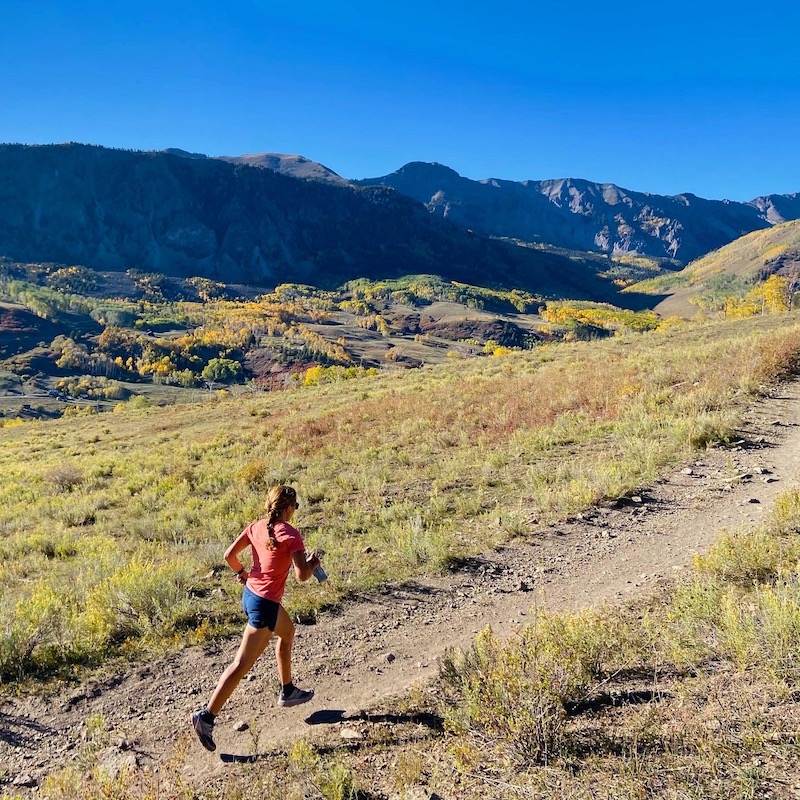What will happen in a week?
A week from now, I’ll drive to Prescott, Arizona, for the 57-mile Whiskey Basin ultra. A week from now, we may or may not know the outcome of the presidential election.
I look at my watch: 2:53 a.m. I’ve been waking up at or near this time on many nights for the last few weeks. I don’t know why the gods have assigned seven minutes ’til 3 to be my worry time.
I reach for my phone and check the weather apps. One says it’s 13 degrees out, the other says 18. Anything under 20 makes me worry about the horses. We’re not blanketing them this early in autumn, because that would inhibit the growth of their winter coats, but I can’t stand the thought of them toughing out the freezing temp. So I put on layers of clothing, slip my feet into the rubber boots I use around the barn, get a flashlight and head into the night.
The moon is almost full, and the stars in the cloudless sky cluster brilliantly. A thin layer of snow glimmers in the flashlight beam. A much-welcome storm blew in a few nights ago, dumping four inches of snow and painting the landscape white, but it’s melting and the long-range forecast looks dry again.
I live in a place with no light pollution, where elk roam on all sides of our house as if they understand our land is a sanctuary during hunting season, and where we track seasons by the cycle of leaves on the aspens. I can almost lose myself in isolation here and set aside thoughts of the country’s problems and politics, but I don’t.

Elk at daybreak a few mornings ago, as seen from our living room window.
I slide open the heavy barn door, turn on the light, and our two horses, the all-white Cobalt and all-black Maverick, stand blinking at me and extending their noses, sniffing for a treat. I run my hands over their necks and feel reassured that although it’s frosty cold, they feel warm enough under their thick hair. I toss two flakes of hay on the ground because their bodies will generate heat as they munch and digest the roughage. I linger longer, petting their necks and scratching behind their ears, thinking of them as “my boys.” I understand that the prominent role these two creatures play in my life is partly a result of being an empty-nester and craving a routine of feeding, cleaning and riding that brings comfort and narrows my focus to simple things that I can control. Much like running.

“My boys” one morning earlier this month, days before all those golden leaves fell.
I return to the house, wash my horsey hands, get undressed and slip back into bed. I can’t help it, I get my phone again, even though I know this device exacerbates insomnia. I use the location-sharing function to make sure my 22-year-old daughter is in her apartment in Venice Beach and my 19-year-old son is in his rental house in Boulder, where they should be, and I’m relieved to see they’re there, but the site of their dots on a map tugs at me and I wonder what they ate for dinner, whether they washed the dishes, how messy their rooms are and when’s the last time they washed their sheets, whether they’re sleeping with anyone, and whether they ever wonder about me this way (I know, not ever).
Then I picture scenes from the last time they lived here at home, at the onset of the pandemic last spring when their colleges shut down, and we shared space and bonded again and lived through COVID illness together. As ominous as the circumstances were as we all faced the pandemic and its shutdown, it was in many ways a blissful time for me as a mother. This past summer, I helped them transition into housing far away. Every day, I feel their absence. While it’s not something I really struggle with, the daily wondering about how they’re feeling and what they’re doing adds to the low hum of anxiety in my head.
And even though I know I should put my phone away and would be better off reading a novel to get back to sleep, I can’t help it, I check the latest numbers on the fivethirtyeight site to study predictions about whether Trump will take Pennsylvania or Ohio. I won’t even go into the myriad ways the country’s leader, and his enablers and followers, have dismayed, depressed and frightened me. Anyone reading this either understands and feels this too, or completely disagrees and thinks I’m the one who’s deluded.
I dip into the news, then I turn it off. I tell myself to accept that I have no control over the news, and that I can’t let the specter of Trump and the country’s decline and the environment’s demise overshadow every moment of the day and keep me up at night. I need to think of the serenity prayer. I need to practice mindful breathing.
I put my hand on my belly to feel deep inhalations, but instead of focusing on my breath, I tune into Morgan’s instead. The sound of his steady, deep breathing at my side brings me serenity like nothing else. Remember this always, I tell myself: He is here, and I am not alone. My mind wanders to that time seven months ago (has it really been that long?) when he got so sick because the coronavirus invaded both lungs and left him dependent on supplemental oxygen. But he recovered, and he’s here. How many women like me are lying in beds alone, aching for the person who used to sleep by their side but is gone now, following perhaps the most brutal aspect of this pandemic: dying alone? The number is horrifying—over 225,000 dead in this country, going higher each day. It’s a collective nightmare. I need to think of something else.
So I reach for my phone again, check email and review a message that brings some satisfaction and gets my mind off all heavy topics. It’s my corrected Spanish homework from my tutor Ana who lives Cuernavaca, Mexico. We have been meeting by Zoom once a week for about four months. I look forward to talking to her in my broken Spanish and hearing about her life, and I’m getting better and better at understanding her flow of words. The short essay I sent her about Día de Muertos has only two corrections in red, and she typed MUY BIEN!!! Along with running and taking care of the horses, studying Spanish has provided me with routine, simple pleasure and escapism. I feel a flicker of pride that I’m getting the hang of the imperfect subjunctive. Si hiciera un altar para mi padre, el altar tendría algunas cosas que le gustaban, como el whiskey, una pelota de golf, y fotos de sus perros. My professional pursuits may be receding as I half-consciously slip into semi-retirement, with freelance writing projects few and far between and coaching taking less than ten hours a week, but I can improve at Spanish. I can hold onto hope that we will travel to South America and Spain again. I can try to become fluent so I can talk to native Spanish speakers here in our community. This hobby is only that, a hobby, but it brings accomplishment and diversion.
Around 4:45 a.m., I give up on sleep because my alarm is set to go off soon anyway. I need to get up early to run and work before spending the better part of the day in the town of Montrose (where I will wince at the profusion of flags for Trump) buying hay and grain for the horses, visiting my mother at her assisted-living home (where we must sit outside at a 6-foot distance, no touching, mask on, all of which exacerbates the confusion of her dementia), and stocking up on groceries at the big City Market.

A sign of the times at the feed store in Montrose.
Unexpectedly, my mind flashes back to the 2011 American River 50, which I haven’t thought about in years. I had to wake up around 2:30 a.m. to have enough time to drive to the start line a couple of hours away. I ran strong in spite of the early wakeup. I can certainly handle today’s run and errands with five hours’ sleep.
In the light of my closet, I look down and contemplate my pajamas. I’m wearing a shirt from the 2019 Grand to Grand Ultra, where I was the female champ; a “No Sleep til Auburn” sweatshirt from the 2016 Western States 100, where I broke 24 hours; and sweatpants from Aravaipa that say “Limitless Vertical Challenge” down one leg, from this summer’s virtual event when I did a double Everest. Am I still the ultrarunner that these clothes suggest? At the moment, I don’t feel like it. But I have put in enough training for this November 7 ultra—I did a peak long run of 34 miles two weekends ago—and I’m determined to go do it. I need to prove to myself I still can run 50-plus miles. I yearn to connect with old running buddies at an ultra—taking precautions for COVID spread, of course—because I need that human connection, the reminder that people are good and I am strong and life goes on.

Peak training run in the Lizard Head Wilderness Area a couple of weeks ago.
I am cautiously optimistic, but can’t be sure, that I will run well enough and finish this ultra in about 12 hours, just as I am cautiously optimistic but can’t be sure that the election results will be orderly and that a peaceful transfer of power will ensue. But I feel certain that I will arrive at the starting line with adequate training behind me and a determination to go the distance, and the certainty of that plan grounds me. Training for this ultra—sticking to a running routine—has given me something to help manage anxiety and pessimism more than anything, even more than the routine of caring for and riding the horses, because of the mood boost and enhanced wellness that come with a run.
The new issue of UltraRunning magazine just came out, prompting me to re-read the column I wrote a couple of months ago for the November issue. It relates to everything I’ve been contemplating and coping with in the middle of the night, so I’ll reprint an excerpt below.
Let’s dare to hope that the weeks ahead bring out the better qualities of ourselves and our country.
Excerpted from my UltraRunning column, which is titled “Survival of the Fittest”:
Something that one of my ultrarunning friends said sticks in my mind as I unapologetically go about ultra training. This person, whom I coach, coped with more stress this year than ever—her father died suddenly, her job shifted into crisis management due to the shutdown, her daughters started schooling at home and therefore needed extra attention, and her region suffered from wildfires. Training, she said, “has not just made me race ready, but pandemic ready.”
She said she doesn’t know what any given day will bring, but she has confidence that the traits developed through running long miles on the trail—in her words, “patience, grit, being in the moment with each step, self-care”—help her get through tough times. “Running is central to my well-being, rather than an add-on,” she told me.
When life shifts into crisis management, and doomsday scenarios dance in your head, that’s the time to prioritize running rather than push it to the side. Think of your ultra training as a form of self-defense. You’re defending yourself against anxiety and depression by calming your mind and boosting your well-being. You’re cultivating a resilient mindset and a routine to help you cope with hardship and uncertainty in other aspects of life. You’re keeping your body as fit and healthy as you can to fight off whatever viruses or environmental toxins may invade your space.
And, you’re ready and able to run if the need to flee arises. It’s not too crazy to think that your ability to run long and fast might actually save you someday.
This thought first hit—and empowered and soothed—me back in 2006, as I sat in Bay Area rush-hour traffic while commuting home from a full-time job. I felt consumed by stress, because I was late returning to my kids (then ages 8 and 5) and their nanny. On the radio, a reporter hyped up the centennial of the great earthquake of 1906 and predicted that another major quake would hit our region any day. I pictured the Bay Bridge collapsing, as it did in 1989, stranding my husband in the city so he couldn’t get back home. It would be up to me to get through gridlocked freeways to reach our kids. Could I do it?
Then I looked out the car window to the greenbelt of hills crisscrossed with trails, and I realized, absolutely! No matter that I worked 35 miles from home. If need be, I could run the whole way! That realization felt deliciously liberating. I’m an ultrarunner. I can run through anything.
Eventually, we’ll collectively return to a normalcy where we can train for and race ultras for all the fun reasons—for the weekend long runs with buddies followed by brunch, for example, and the months-long buildup to plan and execute a sub-24 100-miler. For the peace and beauty of running solo on a trail through a healthy green forest, and for the enthusiastic encounters with volunteers at aid stations, followed by the sound and feel of cowbells and hugs at finish lines.
Until that time, let’s keep running for sanity and self-preservation.

On a run about a month ago. Photo by Billy Yang during his visit.

AMEN!! so much anxiety about all the things and my magic hour is 2:30 a.m. I just signed up for a 50 miler been too long and I need something else to focus on besides all the negativity. Thank you for your words and truth…
Your writing speaks to all kinds of stuff going on right now, for runners and others . . . thanks for putting this into words (plus I love the photos, especially of the aspen and your horses 🙂 )